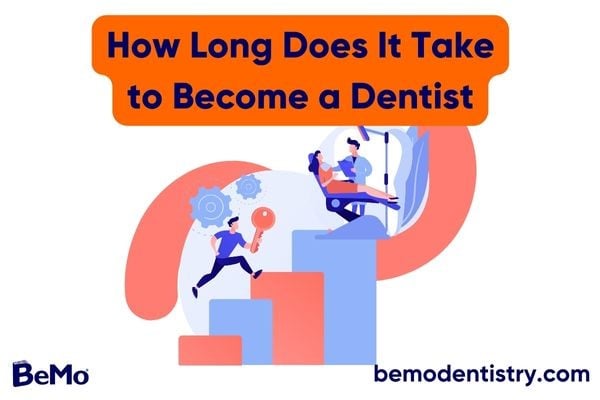How long does it take to become a dentist? The answer is, typically, eight years. I say ‘typically’ only because there can be so many things that happen! For instance, some applicants may take a gap year, just as some people may be able to complete their program faster. The length of time it takes to become a dentist can also depend on your school of choice. In this article I will explore all the various pathways to how to become a dentist, and how long they take!
>>Want us to help you get accepted? Schedule a free initial consultation here <<
How Long Does It Take to Become a Dentist?
Similar to how long it takes to become a doctor, becoming a dentist takes between 8-10 years.
This timeline is based on the time it takes to get an undergraduate degree (four years); plus, the time it takes to finish dental school (another four years).
Here is one of our consultant’s experiences becoming a dentist – it took her 11 years – but she explains why!
“My fate [to become a dentist] was set from a young age. When I was a child, my dentist had a wall of Polaroid pictures of children after their first dental visit. The wall consisted mostly of crying faces. If you searched the wall for my photo, you were met with a huge smile and a double thumbs up! I went on to complete four years of undergrad at Boston University, then a two-year master’s program at the University of Medicine and Dentistry of NJ (now Rutgers), then completed four years of dental school at Case Western Reserve University. I also did a one-year General Practice Residency at Jersey Shore University Medical Center after graduating dental school. That’s 11 years of higher education for me to become a dentist!" - Dr. Amanda Thompson, General Dentist, Case Western Reserve University
Unlike medical school graduates who have to complete at least one year of residency to take their licensing exams, dental school graduates have more choices after graduation.
You can either:
- Get certified in a dental specialty or sub-specialty
- Take either a hospital or community-based residency program
- Enter private dental practice
If you decide on the first two options, you’ll usually spend another year or two in training or performing your residency, which will add more time to your timeline. But if you decide to enter private practice by yourself or with a group of other dentists, then you can start practicing as soon as you pass your licensing exams.
Whichever path you take is based on the goals you set for yourself back when you were asking yourself, ‘why do you want to be a dentist?’ Of course, the goals you set yourself can always change, especially during dental school.
How Long Does It Take to Become a Dentist: Traditional Student (~ 8 Years in Total)
Undergraduate Degree (4 years)
One of the most universal dental school requirements is having a four-year bachelor’s degree. Although, there are exceptions. Many dental schools in both Canada and the US will accept applications from students with at least 90 credits completed and a GPA above a certain threshold – 3.5, for example.
Choosing to go to a dental school without prerequisites is one way that you could possibly shorten the time it takes to become a dentist.
The most common type of dental school prerequisites are science-based and cover:
- Biology
- Inorganic and Organic Chemistry
- Physics
Depending on the dental school, they may require more prerequisites in non-science areas such as the humanities, English or psychology. But if you are able to cover at least the three science-based courses and get grades at or above C or C- then you will still be a viable applicant, provided you cover other important aspects, such as getting enough dental school extracurriculars and having a significant number of dentist shadowing hours.
“I shadowed a general dentist and an oral surgeon prior to applying to dental school. I loved seeing how the general dentist moved seamlessly from appointment to appointment, each different from the last. I enjoyed seeing the technical aspects of oral surgery. It amazed me that it took more time to administer the anesthesia than it did to extract four wisdom teeth. Seeing these providers in their element made me want to combine science, art, and connection even more!” – Dr. Amanda Thompson, General Dentist, Case Western Reserve University
Knowing how to shadow a dentist is something you need to learn in order to get the most from the experience, as many dental schools now have a certain number of shadowing hours you have to complete to apply.
Dental School (4 Years)
As of this writing there are only two dental schools in the United States that offer accelerated three-year programs:
Three-year dental schools are not as widespread as 3-year medical schools, so, unless you attend one of these two schools, you’ll be in dental school 4 years – there is no real ‘fast track’ in dentistry, nor should there be!
Medical and dental schools last four years for a reason – to prepare you for a challenging, high-stakes profession where you are responsible for the health and well-being of patients. In dental school, as in medical school, your four years are usually divided in two:
- Preclinical years (first two years) – where you are introduced to the science and art of dentistry, through classes, lectures, seminars and labs
- Clinical years (last two years) – where you interact directly with patients and learn more about patient care, management, while also performing rounds at local hospitals and clinics
For many, including our own consultant, Amanda, working with patients is the best part of the process (and, of becoming) a dentist:
“I love the connection dentistry provides me. I really enjoy seeing patients every 6 months, sometimes more often. You get to know your patients personally and form wonderful bonds.” - Dr. Amanda Thompson, General Dentist, Case Western Reserve University
Every dental school will have variations on this curriculum. Some dental schools pride themselves on introducing you to direct-patient care in your first year. Others emphasize the longitudinal nature of their curricula, as they introduce different aspects of being a dentist and healthcare, in general, such as public health and social determinants to health, throughout the entirety of your four years.
A dental school advisor can help you navigate the application process:
Should I Do a Dental Residency?
Only a small percentage of US dental graduates pursue residency programs, mainly due to the additional cost.
The following is a list of the many different specialties within dentistry that you can get certified in, if you decide to pursue a particular specialty.
- Oral Medicine: 2-3 years
- Oral Surgery: 4-6 years
- Orthodontics: 2-3 years
- Prosthodontics: 2-3 years
- Pediatrics: 2-3 years
- General Practice: 1 year
- Endodontics: 2-3 years
- Periodontics: 2-3 years
- Dental Anesthesia: 3 years
- Oral Radiology: 2-3 years
You only need your DDS or DMD to be able to write the Integrated National Board Dental Examination in the US. In Canada, the process is similar for the National Dental Examining Board of Canada Exam. And, unlike medical residencies, where residents are paid, most dental residencies require payment from applicants, making immediate practice more financially appealing.
While specialty certification may yield higher earnings in the long run, the initial investment in time and money can pose challenges, impacting loan repayment and income.
How Long Does It Take to Become a Dentist: Non-Traditional/Mature Student (~4-6 years)
Mature students, typically over 25, may face unique circumstances in their journey to becoming a dentist, influenced by factors like gap years since leaving school.
For those out of school for less than five years, the process generally takes around four years, encompassing DAT preparation, building a DAT study schedule, and potential pre-dental coursework.
However, if out of school for more than five years, additional time, typically one to two years, may be needed for prerequisite completion, potentially extending the how long it takes to become a dentist to five or six years.
Post-Bacc/Health Professions Certificate (1-2 years)
The good thing about most post-bacc programs is that they usually only last one year, maybe two, depending on the program. The downside is that they also charge tuition, even though it is not as expensive as four years of dental school.
You’ll find that programs can charge anywhere between $10,000 and $30,000. But many post-bacc programs are aimed at people from disadvantaged and historically underrepresented communities, so you may be eligible for scholarships or grants if the program has specific criteria for incoming students.
How Long Does It Take to Become a Dentist: International Dental Graduates (2 years)
International graduates seeking to pursue dentistry in the US or Canada face challenges due to accreditation standards and citizenship requirements.
While some schools offer alternative tracks for foreign dental school graduates, the process typically involves additional training to align with North American standards.
For instance, programs like the University of Alabama's International Dentist Program (IDP) provide preparatory courses before integration into the domestic curriculum, facilitating a smoother transition into the cultural and professional aspects of dentistry in the US. Upon completion, graduates receive the same credentials as domestic students, enabling them to pursue licensure and practice in the region.
FAQs
1. How long does it take to become a dentist?
Becoming a dentist typically takes eight to ten years, encompassing undergraduate studies and dental school, though timelines vary based on individual backgrounds.
2. Is becoming a dentist worth the time and money?
While dental school entails significant time and expense, its value is evident for those genuinely passionate about dentistry and committed to investing in the profession.
3. Why do dental school last four years?
Dental school's four-year duration balances preclinical and clinical education, covering scientific foundations in the initial years and providing hands-on patient experience in later stages.
4. Why is dental school so expensive?
There are many reasons why dental school can seem more expensive than medical school or other healthcare professions. Some of the reasons are inflation, and schools raising their fees to cover their costs, but other reasons have to do with dentistry itself. Dental students have a lot more equipment, supplies and fees to cover whereas medical schools use hospitals, clinics, and equipment they own to help train students.
5. How can I become a dentist faster?
To expedite the path to dentistry, candidates can complete prerequisites before finishing their undergraduate degree, consider accelerated programs, or opt out of postgraduate training.
6. What do I need to become a dentist?
Competitive candidacy for dental school requires strong academic performance, manual dexterity, a compelling personal statement, and letters of recommendation.
7. How can I prepare to get into dental school?
Prepare by fulfilling prerequisites, gaining shadowing experience, excelling on the DAT exam, and engaging in extracurricular activities that demonstrate desired qualities like resilience and empathy.
8. How much does dental school cost?
Dental school costs vary by institution and country, with US programs ranging from $100,000 to $120,000 and Canadian programs from $50,000 to $100,000, encompassing tuition, living expenses, and fees.

